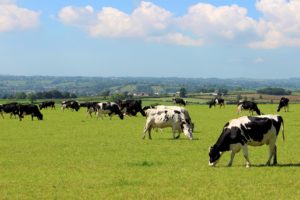As we know, grass can be a very cost-effective feed source and understandably, farmers want to make the most of this. Grass is a good source of rumen degradable protein (RDP), highly fermentable carbohydrates and sugars. To maximise these nutritional benefits, we must be mindful of the challenges it presents. Failure to adjust to these challenges may result in the increased risk of sub-acute ruminal acidosis (SARA). SARA can significantly impair milk yields, butterfat, and milk proteins, preventing acidosis at grass can be key to maximising performance.
The Challenges
Grass Quality (Low Fibre, High Oils, High Sugars)
- Fresh grass has low levels of structural fibre, high oil, and high fermentable sugars.
- This can result in a drop in rumen pH and a reduction of fibre digesting bacteria, further increasing the risk of acidosis.
- The low fibre and potential “coating” of fibre from the oil decreases acetate production; subsequently reducing butterfat levels.

Buffer Feeding (Changing Nutrition)
- The key to improving performance is balancing the changing nutritional qualities of grass throughout the grazing season.
- Overestimation of grass supply and/ or underfeeding of concentrates can cause a drop in performance.
Getting a Consistent Intake at Grass
- Adopting an effective turn out plan for cows at grass is crucial to help mitigate challenges at grass. Consider moisture levels, ground conditions, grass quality and quantity. These all affect intakes.
- To maximise performance (subsequently profitability), consider high-quality concentrate supplementation.
Preventing acidosis at grass and Maximising butterfats: Balancing the Ration
- It is recommended to supplement at grass with concentrates that are high in digestible fibre, for example, Sugar beet. Especially where the grass is of good quality and readily digestible.
- Improved milk protein levels can also be a result of increasing the level of the correct concentrates.
- Controlling the level of Rumen Degradable Protein and Rapidly Fermentable Carbohydrates coming from ingredients such as wheat is important, consider replacing or altering these with ingredients such as maize.
Optimise rumen conditions
Supplementation should be considered to prevent acidosis and to maximise milk constituents.
NWF Ultra Buff
Is a blend of buffering salts including Acid Buf and NWF Opti Rumen. Acid Buf conditions the rumen and allows it to work more efficiently, with its unique honeycombed structure and large surface area. Acid Buf breaks down slowly in the rumen –neutralising significantly more acid, over a longer period.
- Better neutralising of rumen acid ensuring a stable optimal rumen pH
- Improves fibre digestion
- Boosts milk yield and quality
NWF Opti Rumen
A blend of essential oils and spices which increases the amount of bypass protein reaching the small intestine whilst improving nitrogen efficiency in the rumen, shown by a decrease in ammonia release. These factors can lead to lower milk ureas and increased feed efficiency.
- Improves rumen pH
- Increases milk yield and improved milk quality
- Increases fibre digestion
- Increases feed efficiency
NWF Grazing Diets
The NWF Grazemore range is specifically formulated for cattle at grass. Grazemore contains high proportions of digestible fibre, bypass starch and protein to provide a low oil, high magnesium compound. Graze also contains NWF Opti Rumen, to help balance excess rumen protein and buffer the rumen, which is of particular importance whilst grazing improving the rumen pH. A more controlled rumen fermentation can help reduce the risk of SARA.
Speak to your local NWF Sales Specialist, or call 0800 756 2787 for more information on how you can reduce the risk of SARA.
To order NWF grass seeds online with free delivery, click HERE.
Source: AB Vista, 2020

